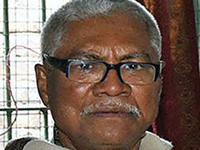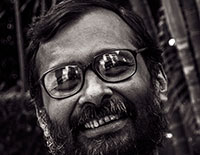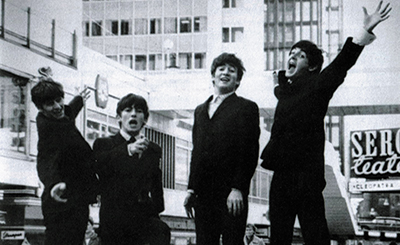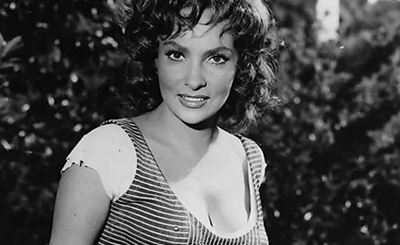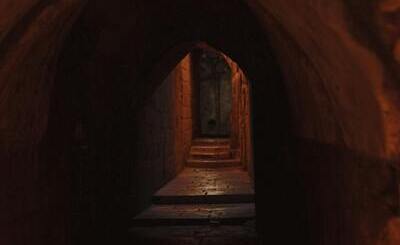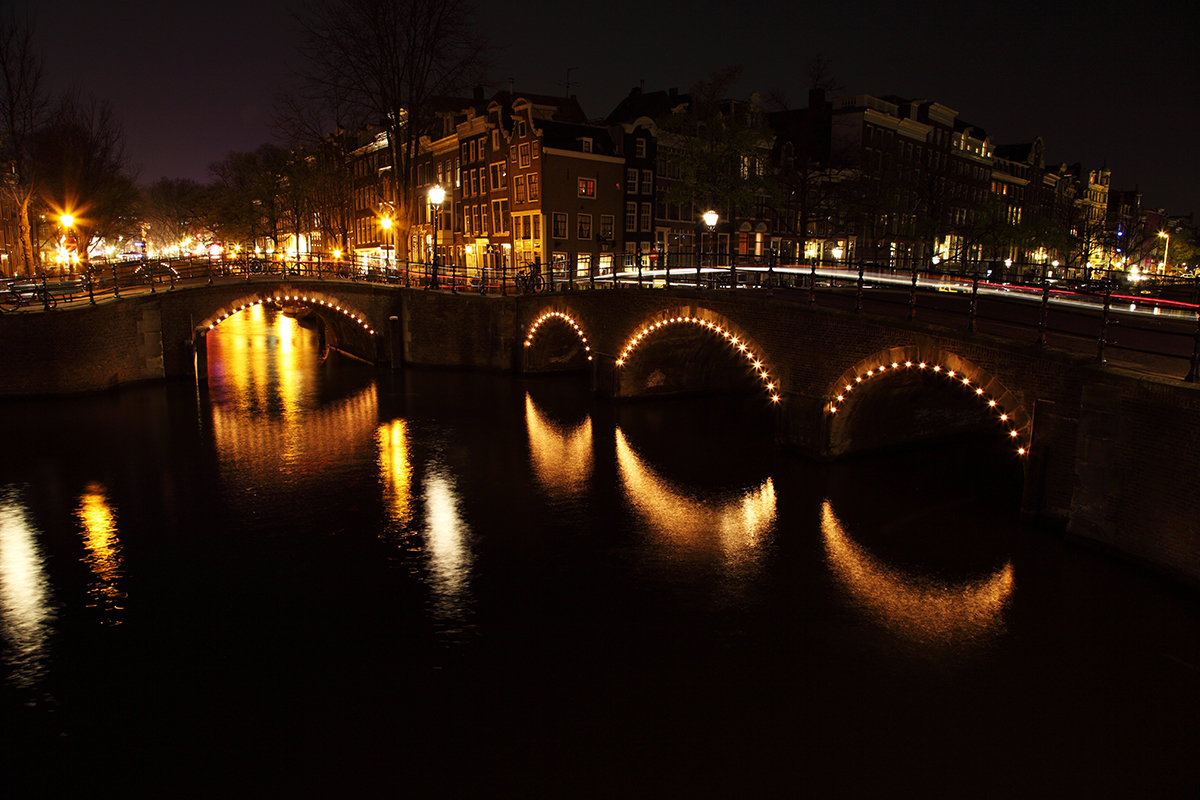
An excerpt from the novel, Chandal Jibon, which is being translated into English by V. Ramaswamy
While working in Bade Lal’s tea-shop at the triangular park in Jadavpur, Jibon tried to find out the whereabouts of the Calcutta he sought. He gathered that the fabled city that he had hoped to find – where money flew in the air – was not north or south but central Calcutta. Where night never descended, kept at bay by thousands of bright lights. It began from Sealdah station. Once he found out about that – then why delay! Why not set out to see that Calcutta! He needed lots of money now. Lots and lots of money. Durga Puja was approaching. He would buy new clothes for the occasion for his parents, brothers and sister – with his own money. A frock with red tinsels for his sister, and full-sleeved shirts and trousers for his brothers. Dhuti-panjabi for his father, and saris, blouses and petticoats for his mother. She mother would need two sets of those.
Quitting his job one day, Jibon set off on foot from Bade Lal’s shop towards the unknown city. But where, how far away was it? He spent many days on the streets of Calcutta in search of that magical city. Jibon had worked for two months in Bade Lal’s shop. The few rupees he had received after deductions — for breaking two glasses and spilling two litres of milk — were soon spent. After that he wandered around aimlessly, roaming the streets, hauling his starving belly. The whole day was spent in this manner. When it was night, he just lay down wherever he happened to be, on the pavement, or a rail station, or under a tree. How could he return empty-handed to his parents after so long? He was too ashamed and sad to face them. How much he had hoped to take new clothes for them! But that was not to be.
In these few months, Jibon had gone round and round the entire city. He had seen every part of the beautiful Calcutta, which was among the largest cities of the world and some two-hundred-and-fifty years old. Jibon thought it was its variety and contrasts, its vanity and wretchedness, its exaltedness and niggardliness that had given it its pre-eminence. He had already got a taste of some of its fare. On one side of the city were tall buildings that arrogantly touched the sky. Inside the buildings were all sorts of means to impart dull wantonness, comfort and luxury. Heartless, mechanical people, who were bedecked from head to toe in expensive garb of exquisite colours, lived there. Like machines, they laughed, walked and talked measuredly. It was hard to find any colour or scent of human feeling in their love and lovelessness, virtuousness and immorality. Everything seemed to be governed by mechanical rules. Ordinary frailties like kindness, caring, affection and love did not trouble or influence them. All of earth’s resources and wealth was dashing at the feet of these machine-folk. It was they who had knowingly erected a mountain of barriers, going down to the lowest man, which hindered the development and expansion of society’s tender nature. That was how their interests were fulfilled. The story of money flying — yes, that money did fly, but it entered their own vaults through the route created by them. Which no one else would ever go near or catch sight of.
Opposite their mansions were run-down, broken huts and shanties of impoverished folk. Starving, ill-fed, sick, sorrowful, defrauded and jobless people lived in those damp huts swarming with mosquitoes and flies. They too were inhabitants of this Calcutta. In order to secure their daily existence, these people, perforce, provided services, deference and obedience to the inhabitants of the tall buildings. In return they received stale bread and a few measly rupees. They received hatred, humiliation, scorn, ridicule and indifference, and sometimes oppression.
There were big hospitals in the city. But they were not for everyone. Those who were excluded lay on the streets and died like cats and dogs for want of treatment. There were shops and markets and big hotels and restaurants here. People went there and some of them spent as much as ten or twenty thousand rupees in a single instance. And exactly opposite, one saw a few people, with battered bowls in their hand, crying, ‘I haven’t eaten for two days, babu, please give me one paisa…’ There were big colleges, universities and educational institutions. But not everyone was able to get educated or enter the educational institutions. Whatever was important, great, precious and beautiful in this city was set in motion, controlled and protected by a group of mechanical men. For two-hundred-and-fifty years had this metropolis survived in this way.
The poor boy gazed wide-eyed at Calcutta, at the loathsome visage of the city. Truly, millions of rupees flew in the wind here. Those who were shrewd enough to catch the flying money could have sackfuls of it. The one who did not know could not do the same. Toil, sweat and honesty had no value in the great city. There was cunning, fraud, artfulness and intrigue everywhere. The ones who were skilled in employing these won everything. Those who did not know were unsuccessful, failures, vanquished. Those who were born of the womb of poverty, who were simple and straight-forward, who were sons-of-labour, could not acquire the requisite skill and artfulness. So they lived in acute hardship and died on pavements, rail stations, beneath trees, in slums or shanties alongside canals and rail tracks. All their desires, dreams, hopes and wishes died with them.
Who knows why, but seeing all this, without his being aware of it, a great cloud formed inside Jibon. But that did not pour down any rain. There were only bursts of thunder and lightning which left him feeling tattered. So many people had so much — but why did he possess nothing? That unresolved question cast a shadow on the innermost recesses of his mind.
Someone or the other had once told Jibon that the wages for minor work were low. The more important the work, the greater the wage. Jibon could not figure out why the men who ploughed the land under sun and rain and provided the food for the country, those who risked their lives during storms and cyclones and caught fish in rivers, those who enabled the good health and the development of the faculties of the people of the country, the workers in farms and factories who worked their hammers and made the country wealthy — how was it that their work was considered small and why were their wages so low! And how was it that the tonsured, brahmins muttering om-bom and ringing bells before stone images in temples; the babu sitting on a chair in his office and sipping tea, dozing and gossiping; and the loudmouth breathing fire before a mic — why were all of them considered ‘big’? So big that there was a mountain of money in their homes! Who made this classification of work? Who determined the remuneration whereby the coolie who carried a load of a quintal on his head would not earn enough to allow him to eat to his fill twice a day and survive? Why was Garib Das compelled to sit all day without food at the railway station? Why did he have to suffer ailments stemming from not eating? Why could he not get a drop of medicine?
Jibon’s young mind minutely sought the answers to these questions. But he could not find any. Hundreds of philosophers had pondered over such questions, over centuries — but they were at a loss, unable to agree on the correct answers. Marx, Gandhi, Ambedkar and Lohia, had all been bewildered — so how could an illiterate boy find the answer?
One day, in the course of his aimless walking, Jibon reached Howrah Bridge. It must have been around noon. He stood there, leaning against a railing. He gazed at the Ganga flowing far below him. The river-bank was far away. Lots of people were bathing there. Bathing in the Ganga was supposed to wash away all sins. Jibon wondered how many times he would have to immerse himself in the Ganga so that the sin for which he was unable to get food was washed away!
Quite a few launches and country boats plied on the river. Jibon had never been on such a vessel. Who knows what it was like on the boat when he came in his infancy in his mother’s arms from the other Bengal … He observed a cargo-laden ship coming from far away, his eyes followed it for a long while. It finally passed by, and with the ship his mind too set off on an endless voyage without destination. Jibon had heard someone narrate the story of Chand Saudagar and his seven ships. Like the ship he had just observed, those too used to travel to many countries with goods to trade. If only Jibon could be on such a ship! He would go away to a country where hardship did not pursue him relentlessly. There was surely such a place, somewhere or the other in the world. He believed that if he kept searching, he would definitely reach the place.
Jibon was unaware how long he stood there lost in his thoughts. Suddenly, he looked behind to see the object of his infinite terror and hatred, a policeman, standing behind him. He had no clue when an armed policeman, who was part of a battalion force, put his hand on his shoulder. “Hey you, why are you bending like that, do you want to die or what? Where do you live? Where are you going? What do you do?”
Jibon had heard that hoodlums caught the children who roamed the city streets, blinded them, broke their limbs and made them beg on the streets. If they were caught by hijras, they would take them away, cut their cock and castrate them and induct them into their band. And if the police caught them, they were taken to jail and thrashed twice a day.
“Why are you crying?” The policeman asked. His voice and his eyes were not exactly like a policeman’s, he seemed to be much more gentle. He seemed human. So Jibon regained something of his confidence. He did not think it was necessary to tell any lies to such a soft-hearted policeman. He told him the truth.
“Babu, we live in Jadavpur. My mother died. My father married again. The new mother beats me up, and doesn’t give me any food. My father has a tea-shop at the triangular park there. I used to wash the cups there and got blisters on my hands and feet. Didn’t give me any medicine either. That’s why I left home. When I don’t have anyone of my own in the world, what’s the point of living? I’ll drown myself in the Ganga …”
The soft heart hidden under the policeman’s uniform was moved seeing the sad boy with blisters on his hands and feet, torn clothes, a scrawny body, big eyes full of tears and hearing his sad story. He wanted to take Jibon along with him, but not to the police station or the juvenile detention centre. He would take him to his police mess, in the Shibpur Reserve Police Line, where a hundred-and-fifty Bengal policemen ate everyday. “Do you want to come with me? You can stay there, eat and work. You’ll get a salary too. If you want to come, let’s go. My duty gets over at two.” The policeman was part of the squad that had come from Rayna police station, in Burdwan. He took Jibon to a police lorry parked nearby and sat him down there. “Don’t go anywhere, sit here. As soon as the relief squad arrives, our duty will be over and we’ll leave.”
Shibpur was nearby. The lorry reached the place in twenty minutes. On the way, the policeman told Jibon, “Stay there for some days, grow up a bit. After that I’ll put you in the police force.”
Jibon did not know how to read or write. Whether or not someone like him could join the police force — he was not bothered about such things right then. He was only thinking about today. He had not eaten for several days, so let’s eat to one’s fill today! When an opportunity had presented itself — why let it go!
The person who was the manager of the police mess also seemed to be a kind man. He gave Jibon an old shirt and a pair of shorts of his to wear. And he told him that there were only five days to go before the end of the month, so he would not pay him for the five days. But he would pay him twenty rupees a month from the next month.
There was a cook in the police mess, whose name was Amulya Thakur. He had been working there for almost ten years. His salary was sixty rupees a month. The members of the mess came and left, after all the policemen’s jobs involved regular transfers. But the cook’s job was a stable one. The mess manager changed every month. But the cook was never transferred. His was the final word in the mess.
The very first day, he told Jibon, “Hey boy, you must do whatever work I instruct you to do. If you do that you’ll keep your job. Or else you won’t have it. After you wake up, go and break coal, light the oven and then bring water from the hand-pump at the far end of the police lines and fill all the drums. It’s this water that’s used for cooking, drinking, washing the utensils and for the members to wash their hands and mouths. After that you have to cut the vegetables and wash the fish and meat. Once the cooking’s done you have to serve the food, and after the members have eaten, you have to clean the tables and then wash the utensils. After that you have some time for rest in the afternoon. In the evening, it’s the same work again, and in addition you have to prepare the dough and make rotis.” But as far as Amulya Thakur was concerned, these did not comprise the real work of Jibon. That was something else. What the real work was — Jibon figured out a few days later.
It must have been about ten at night. All the members of the police mess had eaten dinner and left, some to their barracks and some to their duty. Jibon had finished his work, joined two benches and lain down to go to sleep. Suddenly he saw Amulya Thakur looming over him, standing against the light coming from the far end of the dining hall. He pulled up his dirty, oil-stained lungi and held out his hideous, black and long male organ whose foul smell made him want to retch. This was the real work. Jibon had to pleasure him. The erect organ had to be made limp and normal. Without any restraint or any consideration of modesty, he promptly put it in the palm of Jibon’s hand. “Here, rub it!”
It seemed he had applied something like coconut oil on it. As soon as Jibon touched it, it was as if his whole being was filled with revulsion. The thick, black, smelly, hot organ was like a repulsive leech he had once seen clinging to a buffalo’s rump. But what was Jibon to do then, he held his nose and turned his face away and continued to rub it. And he waited for Amulya Thakur to tell him when to stop. But he was unwilling to let the hapless boy off so easily, with so little. It was Friday, the day on which the authorities in the police lines supplied an intoxicant called rum very cheap. After gulping two pegs of the rum, Amulya Thakur did not care to distinguish between female and male. He said, “Turn around!” So far, although intolerable, somehow Jibon had gritted his teeth and put up with it. But he couldn’t take it any more. This was something that was completely contrary to the culture, education and manners that had been inculcated in him from the time he was born. He said a firm no. Who knows what he had in mind, but Amulya Thakur pulled out a red two-rupee note from somewhere, held it in front of Jibon and said, “Go and see a cinema tomorrow. Don’t say no, come now, take it …”
Jibon was not willing to debase himself like a dog for the red-coloured note. As if from his innermost being, he shouted, “I’ve come to work, and not to do all that. Don’t ask me to do that!”
Don’t ask him! Amulya Thakur wanted to do something. And he had to do it now, and to hell with whatever happened thereafter! The intoxicant in his stomach urged him to do so. He held Jibon down and began to take his pants off. It was the manager’s pair of shorts, which was tied to Jibon’s waist with a string. Amulya Thakur began pulling at the string. Who knows where Jibon — emaciated through starvation — found the strength in his body. He pushed Amulya Thakur hard, throwing him on the floor, and ran into the kitchen. He grabbed the large cooking-spud and held it over his head, like a spear, or like Shiva’s trident, and said, “If you come near me, I’ll kill you! I’m warning you!”
After that, whatever was to be expected happened. Amulya Thakur went nowhere near Jibon at night. But from the very next morning he began finding fault with all his work. If he ground the spices, it wasn’t fine enough, when he washed the vegetables, he found grit in it. When he made rotis, he said they were burnt. When he argued with him he slapped him too. Jibon realised that satisfying Amulya Thakur was beyond his capability. And it was difficult to work here if he was dissatisfied. So one afternoon, without telling anyone anything, he decided to quit and went away. Once again, he lost a secure shelter, regular food and the monthly salary of twenty rupees. He was unemployed and shelterless. Once again, Jibon spent the next few months on the streets. He roamed here and there all day, and when it was night, he slept in a park, or a rail station, or a vacant garage, or even on the pavement. And so were Jibon’s days and nights spent.
More from The Byword
Comments
*Comments will be moderated



